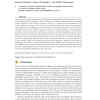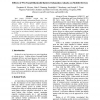832 search results - page 13 / 167 » Effect of Malicious Synchronization |
WCET
2010
13 years 7 months ago
2010
The assumption of task independence has long been consubstantial with the formulation of many schedulability analysis techniques. That assumption is evidently advantageous for the...
USS
2010
13 years 7 months ago
2010
The Domain Name System (DNS) is an essential protocol used by both legitimate Internet applications and cyber attacks. For example, botnets rely on DNS to support agile command an...
ICDCSW
2002
IEEE
14 years 2 months ago
2002
IEEE
Time-driven Key Sequencing (TKS) is a key management technique that synchronizes the session key used by a set of communicating principals based on time of day. This relatively lo...
IFIP
2004
Springer
14 years 3 months ago
2004
Springer
We study from an implementation viewpoint what constitutes a reasonable and effective notion of structural equivalence of terms in a calculus of concurrent processes and propose op...
HICSS
2010
IEEE
14 years 4 months ago
2010
IEEE
This paper provides insight into the ramifications of battery exhaustion Denial of Service (DoS) attacks on battery-powered mobile devices. Several IEEE 802.11 Wi-Fi, IEEE 802.15....


